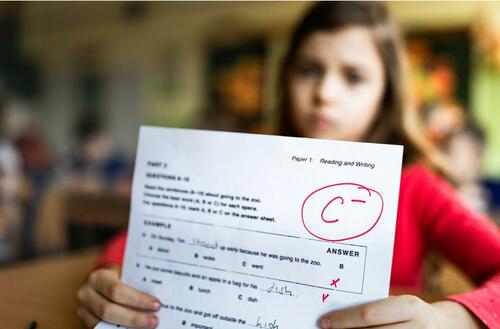
Authored by Michael Brockman via RealClearEducation.com,
ChatGPT, a new Artificial Intelligence tool from OpenAI, is as simple to use as a search engine but can generate almost any text on command in response to a user prompt. Already, users have discovered that it can compose new songs, write essays, and take tests. It can even craft a rhyming poem about how to hotwire a car (but only if you ask it the right way). The tool reportedly scored an 82 on an IQ test, a 1020 on the SAT, and showed itself to have establishment liberal political leanings. Tools like ChatGPT have the potential to change society dramatically – and education, in particular, may never be the same.
Over recent decades search engines, graphing calculators, cell phones, and self-guided resources like YouTube and Khan Academy have led teachers to view their own role as less “sage on the stage” and more “guide on the side.” These advancements also exponentially increased the ease of cheating and left educators forced to make tough choices about the extent to which they should accept these developments or engage in a technology arms race to combat them.
But ChatGPT is the first tool that enables students to request, say, a four-paragraph academic essay on the differences between the Ottoman and Safavid empires and receive just that, instantaneously. Reading such outputs, you may try to assure yourself that these answers are being sourced from some vast, hidden encyclopedia and, as soon as teachers begin to see dozens of identical essays, that the game will be up. But that’s not the case. Add sufficient detail or modifications to your prompt, and ChatGPT will likely produce a totally different essay.
Educators will have to respond to these changes, but policymakers will have to cope with them, too. When asked to write a bill for a member for Congress that would make changes to federal student aid programs, ChatGPT produced one in seconds. When then asked for Republican and Democrat amendments focused on consumer protection, it delivered a credible version that each party might conceivably offer. It even matched the propensity of most members of Congress to order a federal agency to do something without outlining limits on that power. Add this to the list of potential dangers from AI that we have not yet fully grasped.
Access to nearly unlimited knowledge through the Internet has made formal education more important in some ways and less so in others. Children need to learn how to use the tools that adults take for granted and to navigate multiplying pitfalls. Such technology will also raise issues of “job displacement as more tasks and activities are automated using AI” – at least, that’s what ChatGPT said when I asked. It may feel that we are barely coping with the effect of technology’s breakneck pace of change. And someone just hit the accelerator.
Tools like ChatGPT can also help us, though. As with past technologies, some jobs will benefit, seeing some of their drudgery reduced. In K-12 education, reformers have been calling for an AI-driven revolution in customized learning for years. We may now have a way to deliver, while also providing personalized tutoring for all. That is not to say that ChatGPT is perfect. It still often stumbles and can miss on basic facts that Google or commonsense would easily supply. Nor does it yet come close to matching the capabilities shown in the novel “Young Lady’s Illustrated Primer,” which describes how young people are provided with an end-to-end, customized education.
Still, such tools get us closer to these scenarios and can help close access and opportunity gaps. They can open doors to new methods of learning, democratize educational resources currently reserved for expensive and elite universities, and create new online economies along with the training pathways necessary to access them. In order to realize this potential, AI creators must resist the temptation to put the best features behind paywalls or bow to the pressures that have resulted in censorship on social media.
These technology-driven disruptions will not be smooth, even if they can make us better off in the long run. Among the worst things we could do would be to let the drawbacks of these technologies deny us their benefits. In addition, the net effect of these changes will not be felt equally, so we all had better improve our capacity for compassion soon. Telling coal miners to “learn to code” was a bad strategy in the past, and it’s even worse now, when AI tools can write entire software applications from scratch.
The impact of ChatGPT and similar tools on education and the workforce may not yet feel much different than the trends of recent decades, but the depth and breadth of the changes brought by AI tools is accelerating and may be something new entirely. Policymakers have a responsibility to be nimble in their response and avoid using regulation as a “cure” to perceived short-term ills. This will not be the last time that technology will disrupt education, the workforce, and the broader society.
Authored by Michael Brockman via RealClearEducation.com,
ChatGPT, a new Artificial Intelligence tool from OpenAI, is as simple to use as a search engine but can generate almost any text on command in response to a user prompt. Already, users have discovered that it can compose new songs, write essays, and take tests. It can even craft a rhyming poem about how to hotwire a car (but only if you ask it the right way). The tool reportedly scored an 82 on an IQ test, a 1020 on the SAT, and showed itself to have establishment liberal political leanings. Tools like ChatGPT have the potential to change society dramatically – and education, in particular, may never be the same.
Over recent decades search engines, graphing calculators, cell phones, and self-guided resources like YouTube and Khan Academy have led teachers to view their own role as less “sage on the stage” and more “guide on the side.” These advancements also exponentially increased the ease of cheating and left educators forced to make tough choices about the extent to which they should accept these developments or engage in a technology arms race to combat them.
But ChatGPT is the first tool that enables students to request, say, a four-paragraph academic essay on the differences between the Ottoman and Safavid empires and receive just that, instantaneously. Reading such outputs, you may try to assure yourself that these answers are being sourced from some vast, hidden encyclopedia and, as soon as teachers begin to see dozens of identical essays, that the game will be up. But that’s not the case. Add sufficient detail or modifications to your prompt, and ChatGPT will likely produce a totally different essay.
Educators will have to respond to these changes, but policymakers will have to cope with them, too. When asked to write a bill for a member for Congress that would make changes to federal student aid programs, ChatGPT produced one in seconds. When then asked for Republican and Democrat amendments focused on consumer protection, it delivered a credible version that each party might conceivably offer. It even matched the propensity of most members of Congress to order a federal agency to do something without outlining limits on that power. Add this to the list of potential dangers from AI that we have not yet fully grasped.
Access to nearly unlimited knowledge through the Internet has made formal education more important in some ways and less so in others. Children need to learn how to use the tools that adults take for granted and to navigate multiplying pitfalls. Such technology will also raise issues of “job displacement as more tasks and activities are automated using AI” – at least, that’s what ChatGPT said when I asked. It may feel that we are barely coping with the effect of technology’s breakneck pace of change. And someone just hit the accelerator.
Tools like ChatGPT can also help us, though. As with past technologies, some jobs will benefit, seeing some of their drudgery reduced. In K-12 education, reformers have been calling for an AI-driven revolution in customized learning for years. We may now have a way to deliver, while also providing personalized tutoring for all. That is not to say that ChatGPT is perfect. It still often stumbles and can miss on basic facts that Google or commonsense would easily supply. Nor does it yet come close to matching the capabilities shown in the novel “Young Lady’s Illustrated Primer,” which describes how young people are provided with an end-to-end, customized education.
Still, such tools get us closer to these scenarios and can help close access and opportunity gaps. They can open doors to new methods of learning, democratize educational resources currently reserved for expensive and elite universities, and create new online economies along with the training pathways necessary to access them. In order to realize this potential, AI creators must resist the temptation to put the best features behind paywalls or bow to the pressures that have resulted in censorship on social media.
These technology-driven disruptions will not be smooth, even if they can make us better off in the long run. Among the worst things we could do would be to let the drawbacks of these technologies deny us their benefits. In addition, the net effect of these changes will not be felt equally, so we all had better improve our capacity for compassion soon. Telling coal miners to “learn to code” was a bad strategy in the past, and it’s even worse now, when AI tools can write entire software applications from scratch.
The impact of ChatGPT and similar tools on education and the workforce may not yet feel much different than the trends of recent decades, but the depth and breadth of the changes brought by AI tools is accelerating and may be something new entirely. Policymakers have a responsibility to be nimble in their response and avoid using regulation as a “cure” to perceived short-term ills. This will not be the last time that technology will disrupt education, the workforce, and the broader society.
Loading…







